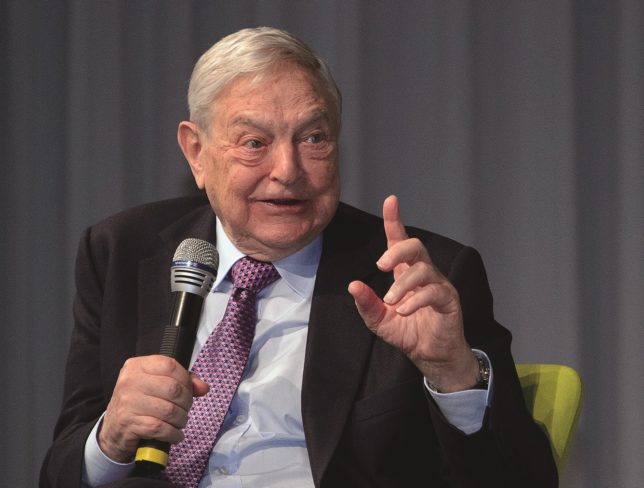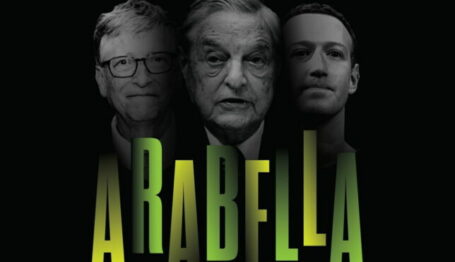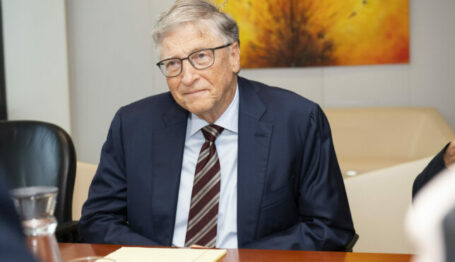Book Profile
George Soros: Strategic Giving
 George Soros. Credit: Heinrich-Böll-Stiftung. License: https://bit.ly/2PWCeWn.
George Soros. Credit: Heinrich-Böll-Stiftung. License: https://bit.ly/2PWCeWn.

A Peek into the Mind of George Soros (full series)
Philosophy | Strategic Giving
Correcting America’s “Shortcomings” | A Conservative Response
Summary: In his latest book, George Soros explains and defends his philanthropic work and the philosophy driving it. By seeing Soros as a principled human being who has philosophical ideas, we can critique Soros more productively, calmly and rationally taking on his philosophical ideas and combating them with our own.
Strategic Giving
In explaining his life’s work, Soros conveys how he thinks strategically, as in how he uses philanthropic contributions to bring about his geopolitical goals. “We fund dissident activities,” Soros admits explicitly at one point. He does this by giving money to groups in closed societies that are already playing active roles in speaking out against the established powers: “I aspire to make the world a better place by enabling people to change it.” By financially enabling critics of the authorities and the monoculture within a given country, Soros lets the new culture change the political regime without the dissidents needing to fire a single bullet.
For instance, when trying to “reopen” societies that had just broken free of Soviet control in the late 20th century, Soros dedicated a third of his foundation’s budget to education because he saw it as a way to reeducate the youth with democratic values. He has designed fellowship grants to encourage professors to travel to the West to study. Then, he has offered them even more money to return home, thereby cross-pollinating the closed, authoritarian society with Western democratic ideas.
At the time, another third of his foundation’s budget went to activists who were educating vulnerable ethnic populations on the margins of Eastern European countries, such as the Gypsies. He wanted this marginalized group to feel “proud to be Roma” because it would introduce a notion of ethnic pluralism into the closed societies and thereby balance out their structures of hegemonic power, reducing the potential for future authoritarian insurrections.
This line of thinking can also be seen in how Soros used his Central European University (CEU) as a tool for change, such as by funding professors to teach about the intersectionality of religions in the middle ages—that is, trying to back up the claim that Europe has a multiculturalist identity—or by hiring a close friend of Popper to lecture on the perils of nationalism. He has awarded annual Open Society Prizes to academics whose work reflected the mission of CEU, a prize that exists to this day. He brags about the fact that CEU churns out graduates who went on to become political leaders in developing countries, thus exporting “open society” ideologues globally.
Leftist, Anti-Marxist
While Soros is undoubtedly a leftist, he is not a Marxist. He talks about his role in undermining Karl Marx University in Hungary during the Cold War and by extension the communist government of Hungary. In the second chapter, he states that he sought to create an embryo free market within the Soviet Union’s planned economy so that he could overturn it. In the sixth chapter, an abridgment of his 2014 essay in the Journal of Economic Methodology, he called the theories of Marx and Freud “pseudo-scientific,” citing Popper’s defining a scientific theory by its falsifiability.
In his 2018 speech at the World Economic Forum in Davos, he painted his foundations and wealth as fundamentally necessary weapons in the war against authoritarians. He does not want his philanthropy questioned or his wealth (gained through capitalism) redistributed. He wants to spend it how he wants and feels that effective humanitarianism cannot be accomplished in any other way.
He is not really interested in raising “class consciousness” as Marxists are. He is a lowercase-d democrat, more a fan of democracy than of classical liberal capitalism, but he believes his foundations owe their success to his entrepreneurial spirit—the spirit of a capitalist fused with the soul of a humanitarian.
But Soros takes Popper’s analysis a step further than Popper did and indicts the efficient market hypothesis and rational choice theory (the main ideas behind the classical, neoclassical, Austrian, and Chicago School theories of economics) as pseudoscientific as well. In place of a laissez-faire trust in the rationality of the market, Soros repeatedly recommends increased government regulation of markets to prevent 2008-style financial crises.
He is against the far left yet a strong advocate for state intervention in economics—not to plan the economy Soviet-style but to prevent collapses to ensure the endurance of liberal capitalism. But he vehemently opposes governments that seek to regulate virtually anything other than the market, whether immigration, marriage, or obscenity—restrictions he views as usually championed by the conservative side of the political spectrum. He likes to call these types of right-of-center governments “mafia states,” including Hungary, Russia, and Trump’s alleged vision for America. Interestingly, he wants Trump to be even harsher on China and fight their Belt and Road Initiative. But he still loathes Trump and thinks that America has “shortcomings” in achieving true open society status.
In the next installment of “George Soros,” learn about his efforts to correct America’s flaws.



